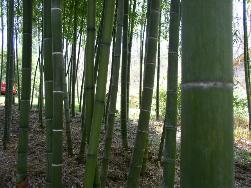China has at present more than five million hectares of bamboo plantation and still growing. In recent years bamboo has also been lauded as a source of fabric.
Bamboo cloth is gaining popularity in the world market, for its softness comparable to silk and its ability to produce fabrics that breathe.
Few are aware that there are at least 1500 recorded uses of bamboo. It can be used either as food (bamboo shoot), shelter (bamboo grove or rest houses), clothing (bamboo fabric), protection (fence, windbreaker and soil erosion) and fishing materials.
Its roots are used for handicrafts such as carvings and charcoal, the butt and lower portion of the culm are used for furniture and construction. Other uses include brooms made from their branches and fodders from their leaves.
There are also industrial bamboo products such as floorboards, panel boards, pulp and paper, textile, activated charcoal, utensils, activated charcoal and chemicals as well as beer, wine an medicines. Bamboo can be planted on lands that are idle, and that are not in use or not suitable for food production.
Bamboo can easily fill the gap to convert lands into a more productive venture and an excellent resource of bamboo materials in the manufacture of quality products through the use of ecological friendly technologies and advocate for a widespread use of bamboo for ecological and economic purposes.
Bamboo long stems, shallow roots and a talent in cleaning the air are among its best characteristics. As a hardy plant, it can remove carbon dioxide from the atmosphere as well as pump out oxygen. Its rhizomes or roots network can help bind at least six cubic meters of soil and prevent soil erosion. It manufactures its own antibacterial compounds and can thrive without pesticides.
In China where bamboo is revered as an indigenous plant, thousands of hectares of land are planted to reforest bald mountains. It has also the ability to rejuvenate degraded lands. It is also a good protection against landslide, slippage and erosion, this make it an ideal plant to address such problems.
Bamboo is said to possess certain qualities that may yet help save the earth from destruction posed by global warming. Bamboo helps in carbon sequestration thus mitigating global warming and the conservation of biodiversity. It also produces a big amount of biomass, which conserves ground moisture and decomposes into organic matter that enriches the soil.
One of the major causes of global warming is carbon dioxide emission into the atmosphere from factories, industrial plants, vehicles, bush or forest fires and other of either man made or natural causes.
One hectare of bamboo plantation, it is said can sequester up to twelve tons of carbon dioxide per year. The bamboo industry through reforestations not only can improved farmers livelihood but it can also improved the quality of air we breathe and prevent our environment from deterioration.
